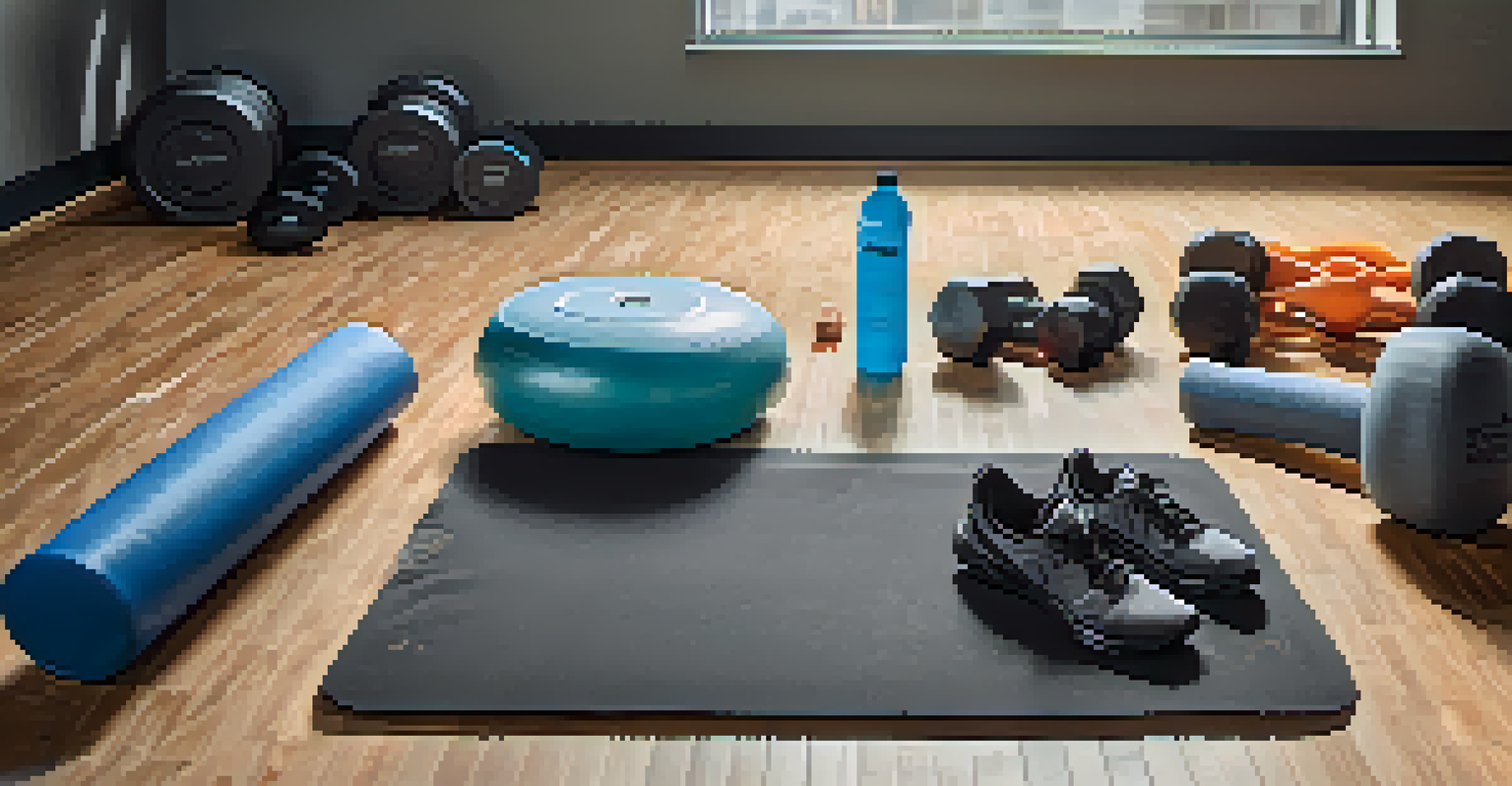Coping Strategies to Enhance Bodybuilding Recovery Efficiency

Understanding the Importance of Recovery in Bodybuilding
Recovery is a crucial component of any successful bodybuilding routine. Without proper recovery, your muscles don't have the chance to rebuild and grow stronger after intense workouts. Think of recovery as the time your body gets to recharge its batteries, ensuring you're ready to tackle the next challenge.
The more you sweat in training, the less you bleed in battle.
Bodybuilders often focus heavily on training but can overlook recovery strategies. Just like a car needs regular maintenance to run smoothly, your muscles need downtime to repair and grow. Ignoring this vital aspect can lead to fatigue, decreased performance, and even injuries.
Incorporating effective recovery strategies not only enhances muscle growth but also improves overall well-being. By prioritizing recovery, you're investing in your long-term fitness goals, making it a fundamental part of your bodybuilding journey.
The Role of Nutrition in Enhancing Recovery
Nutrition plays a pivotal role in the recovery process for bodybuilders. Consuming the right nutrients helps to repair muscle tissue and replenish energy stores. Imagine your body as a construction site; without the right materials, the building process simply can't continue efficiently.

Post-workout nutrition is especially important. A balanced meal or snack that includes protein and carbohydrates can significantly speed up recovery. For example, a protein shake with a banana can provide the necessary building blocks for muscle repair while restoring glycogen levels.
Recovery is Key to Muscle Growth
Proper recovery allows your muscles to rebuild and grow stronger, making it essential for any successful bodybuilding routine.
Hydration is another critical aspect of nutrition. Drinking enough water before, during, and after workouts helps prevent dehydration, which can hinder recovery. Keeping your body well-hydrated is like ensuring your engine runs smoothly—it's essential for optimal performance.
Sleep: The Unsung Hero of Recovery
Sleep is often underrated in the realm of bodybuilding recovery, yet it is one of the most vital factors. During sleep, your body undergoes critical repair processes that facilitate muscle growth and recovery. Think of sleep as the ultimate reset button for your body, allowing it to heal and rejuvenate.
Take care of your body. It's the only place you have to live.
Aim for 7-9 hours of quality sleep each night to maximize recovery. Poor sleep can lead to imbalances in hormones like cortisol and testosterone, which are essential for muscle development. Just as a phone needs to be charged overnight to function properly the next day, your body requires adequate sleep to perform at its best.
Creating a sleep-friendly environment can enhance the quality of your rest. This includes maintaining a cool, dark room and minimizing screen time before bed. Prioritizing sleep can lead to improved performance, mood, and overall health.
Incorporating Active Recovery Techniques
Active recovery involves engaging in low-intensity exercise after intense workouts, which can promote blood flow and reduce muscle soreness. Think of it as giving your muscles a gentle massage through movement, helping them recover more effectively. Activities like walking, light cycling, or yoga can serve as great options.
One of the benefits of active recovery is that it keeps you moving without adding significant strain on your muscles. This can help alleviate stiffness and promote flexibility, making it easier for you to tackle your next workout. Consider it a way to stay in tune with your body while still allowing it to recover.
Nutrition Fuels Recovery Process
Consuming the right nutrients post-workout, such as protein and carbohydrates, is crucial for muscle repair and energy replenishment.
Scheduling active recovery days into your routine can also enhance your overall training consistency. By providing your body with a break while staying active, you create a balanced approach to your fitness regimen that supports long-term success.
Utilizing Stretching and Mobility Work
Incorporating stretching and mobility work into your recovery routine can significantly enhance your flexibility and range of motion. By regularly stretching tight muscles, you prevent injuries and improve overall performance. It's like oiling the hinges of a door—keeping everything moving smoothly.
Dynamic stretching before workouts prepares your muscles for action, while static stretching after workouts aids in recovery. These practices help to release tension and promote relaxation, making your body feel rejuvenated. Think of stretching as a way to give your muscles a gentle release after they've been worked hard.
Consider adding mobility exercises that target joints and connective tissues as well. This not only aids in recovery but also contributes to better lifting form and technique. A flexible body is a resilient body, ready to tackle any challenge that comes your way.
Mindfulness and Mental Recovery Techniques
Mental recovery is just as important as physical recovery in bodybuilding. Stress can negatively impact your performance and recovery, making it essential to incorporate mindfulness practices. Techniques like meditation or deep breathing can help clear your mind and reduce anxiety, setting the stage for a successful workout.
Engaging in mindfulness can also enhance your focus during training sessions. By being present in the moment, you can better connect with your body and its needs. Imagine being a musician tuning into each note—this level of awareness can translate into more effective workouts and recovery.
Sleep Enhances Performance and Health
Prioritizing quality sleep helps your body repair itself and balances hormones necessary for muscle development.
Setting aside time for mental recovery can create a more balanced approach to bodybuilding. Just as you schedule workouts and meals, make time for activities that nurture your mental well-being. This holistic approach will support both your physical and mental performance.
The Benefits of Proper Recovery Equipment
Investing in recovery equipment can significantly enhance your muscle recovery process. Foam rollers, massage guns, and compression garments are just a few tools that can aid in reducing soreness and improving blood circulation. Think of these tools as your personal recovery team, working hard to support your body.
Foam rolling helps to alleviate muscle tightness and improve flexibility, while massage guns provide targeted relief to sore areas. These methods can help you bounce back quicker, allowing you to maintain a consistent training schedule. Imagine having a personal masseuse ready to assist you after every workout!

Compression garments can also play a role in recovery by reducing swelling and promoting blood flow. Wearing these during or after workouts helps your muscles recover faster and can make a noticeable difference in how you feel. Embracing these tools can be a game-changer in your bodybuilding journey.